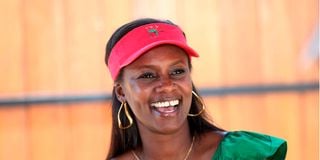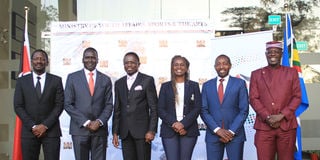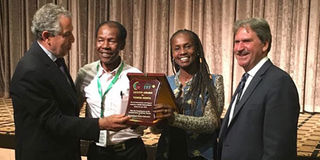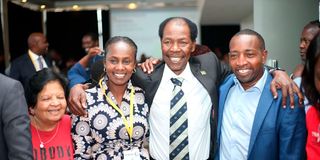Premium
Trailblazing Wanjiru Mbugua sets bar high for sports administrators

Tennis Kenya Secretary General Wanjiru Mbugua Karani who doubles up as Confederation of African Tennis (CAT) Zone IV President and Vice President, during the interview with Nation Sport on the sidelines of ITF Women (W25) World Tennis Tour Finals at Karen Country Club on December 17, 2023.
What you need to know:
- Against all odds, Mbugua, the Tennis Kenya Secretary General, was elected, trouncing her challenger Zayya Mahmoud from Comoros after garnering six against five votes
- It was a historic moment for gender equality in tennis in the region as two women were elected to CAT executive for the first time with Mbugua being joined by Fatime Kanté from Seychelles as CAT Women Representative
- Mbugua's leadership skills are perhaps inborn having single-handedly set up a fully operational Tennis Kenya secretariat at Nairobi Club while still a student at Daystar University back in 1995
"Yes, you have one of the richest curriculum vitae in sports especially tennis but we feel it’s not yet your time."
That was the response from some of the delegates at the 50th Confederation of African Tennis (CAT) Elective General Assembly (AGM), who openly told Wanjiru Mbugua off.
During the AGM held on October 27, in Nairobi, all the five CAT Zones were to hold their respective AGMs with those winning the presidency automatically becoming CAT Vice Presidents.
The newly created Women’s Representative post at the main CAT AGM was also to be contested for.
Then the 49-year-old mother of three pulled out her racket, tossed herself to the courts to contest for the CAT Zone IV Presidency, bypassing Women’s Representative post that many thought was naturally hers.
With no proper campaign skills or strategy, it was a tough call for Mbugua as she did not know how the 12 countries would vote. Some of the delegates had even vowed not to vote for her!
Against all odds, Mbugua, the Tennis Kenya Secretary General, was elected, trouncing her challenger Zayya Mahmoud from Comoros after garnering six against five votes.
The two candidates had tied with five votes each after the first round of voting with one vote being marked as spoilt before Mbugua won in the second round to become the first female CAT Zone IV President and CAT Vice President.

Tennis Kenya Secretary General Wanjiru Mbugua Karani during the Confederation of African Tennis (CAT) Annual General Meeting in Nairobi on October 27, 2023. Wanjiru has been elected the Eastern Africa (Zone IV) President and automatically becomes one of Vice Presidents of Confederation of African Tennis (CAT).
Historic moment
Mbugua automatically became one of the CAT Vice Presidents, replacing another Kenya Patrick Gichira, who had served for 12 years.
The elections, that featured 12 members were presided over by the President of the International Tennis Federation (ITF) David Haggerty of the United States.
It was a historic moment for gender equality in tennis in the region as two women were elected to CAT executive for the first time with Mbugua being joined by Fatime Kanté from Seychelles as CAT Women Representative.
Mbugua’s status arguably confirmed her as a fast-rising iron lady of Kenyan sports.
This is something she started cultivating earlier when she single-handedly set up a fully operational Tennis Kenya secretariat at Nairobi Club while still a student at Daystar University.
“My biggest fear was failure and it made me reluctant but I told myself that if I was able to marshal support to have different programs coming to Africa then I can achieve a lot if elected,” says Mbugua, the International Tennis Federation (ITF) Advantage All Ambassador former ITF Gender Equality.
“I had achieved a lot and I thought I could achieve more if elected in the male dominated field. I said failure is a part of life whether I win or lose hence I went for it,” says Mbugua.
Natural leader
Mbugua thanks Tennis Kenya President James Kenani, Tennis Kenya Council and the National Olympic Committee of Kenya Secretary General Francis Mutuku, for tirelessly campaigning for her among members.
“I was lucky to have the support of Kenani and Mutuku on my side,” says Mbugua, revealing that she was inspired by Catrina Adams, who was the President and CEO of the United States Tennis Association and chairperson of the US Open as well as the International Tennis Federation Fed Cup (now Billie Jean King Cup) and Gender Equality in Tennis (now ITF Advantage All) Commissions.
Mbugua's leadership skills are perhaps inborn having single-handedly set up a fully operational Tennis Kenya secretariat at Nairobi Club while still a student at Daystar University back in 1995.
From serving as Tennis Kenya player and captain, Mbugua has been Tennis Kenya Secretary General since 2015 before her appointment as the Chief Executive Officer for Team Kenya to Paris 2024 Olympic Games in January last year.

From left: James Ndege, NOC-K president Paul Tegat, Sports CS Ababu Namwamba, Tennis Kenya Secretary-General Wanjiru Mbugua-Karani, NOC-K Secretary General Francis Mutuku and 2024 Paris Olympic member Ndimi Kisalu at Maktaba Kuu office in Nairobi on January 30, 2023.
But her advocacy and campaign at the ITF Advantage All Commission that saw Africa finally host its own Billie Jean King Cup (formerly International Tennis Federation Fed) starting this year is one of the huge milestones for Wanjiru Mbugua.
ITF formed Advantage All Commission then Gender Equality Commission was formed in 2018 aimed at promoting gender equality in tennis with a goal of 30 percent female board members in regional associations by 2024.
Kenya bagged bronze while Morocco were crowned the champions during the 2023 Billie Jean King Cup Africa Group III tournament in June at Nairobi Club.
Morocco got promoted to Group II next from the tournament that attracted 12 countries.
“Having African countries battling in their own tournament gave me great satisfaction," intimates Mbugua.
Mbugua reveals that most African countries failed to attend this championship that was staged in Europe owing to visa or finance issues.
Her strong advocacy for gender equity, earned her a well-deserved Lifetime Award, through demonstrating her commitment to tennis growth and development in Kenya.
Jean-Claude Talon of Benin was elected the ninth President of CAT, succeeding Tunisian Tarak Cherif.
"My elevation will help women's voices to be heard, hence ending the stereotyping. It can be lonely at times when you are the only one in a meeting dominated by men but that is the price we must pay for changes to come," said Mbugua, adding that she will be a servant of all and not women only.
The research that worked wonders
Mbugua reveals that in some cases women's contribution aren't valued or taken seriously but a similar take from men would elicit reaction. "I have to develop thick skin," said Mbugua in mitigation.
When Mbugua joined Daystar University from Loreto Convent Msongari School for her Bachelor of Arts in Communication degree in 1993, she was required to do a research module in her third year in 1995.
With her rich tennis background, having represented Kenya at the age of 17 at the 1991 African Games in Cairo, and being ranked fifth in Africa, Mbugua decided to research why the game of tennis wasn’t thriving in Kenya.
Mbugua was at home with Communication and tennis by virtue of her father Bedan Mbugua having been Chief Editor of The People Daily and an avid tennis player.

International Tennis Federation (ITF) President David Haggerty (right) and Confederation of Africa Tennis (CAT) president Tarak Cherif (left) present the top Africa Award for most progressive Federation to Tennis Kenya president James Kenani (second left) and Secretary Wanjiru Mbugua (second right) on April 28, 2018 in Kigali, Rwanda.
The key thing that came out in Mbugua’s research paper is that communication was lacking between Tennis Kenya, the Kenya Lawn Tennis Association (KLTA) federation and players.
“I discovered that if you wanted to find out something about tennis you had to really look for this information with Tennis Kenya not having a full operational office,” notes Mbugua, adding that even though Tennis Kenya had an office at Nairobi Club, it was only opened once a month when there was a council meeting.
Mbugua was happy that she scored an A in her research but thought it wasn’t going to help her if it remained on the shelves. She wanted it to help the game she fell in love with after ditching sprints and long jump in school.
Then Mbugua decided to visit then Tennis Kenya chairman James Kenani at his Kencom House office where he was the KCB Bank Communications manager, to discuss her research.
“His secretary ushered me into his office even without an appointment. He was so welcoming and I went straight to my presentation in my research,” says Mbugua, who at the end of, told Kenani it will serve the game better if he had a full time office at the Nairobi Club to help players and people get information and run events from there.
“It shocked me that he immediately gave me the leeway to come up with a proposal on how to go about it. Since I was still in college and in my final year in 1996, I agreed to open the place three times a week in the morning hours,” says Mbugua, noting that even though Tennis Kenya was running the ITF Schools Tennis Initiative, the person running it had no office.
Mentored by Kenani
Mbugua was amazed with what was happening with Tennis Kenya executive giving her some work to do at some stipend as Kenani, being good in communication, edited most of the minutes she used to write.
Mbugua started running events from scratch, keeping data and doing ranking for players as she also teamed up with veteran coach Peter Wachira to conduct coaching courses in Level I and II.
“That is also one of the milestones I achieved,” says Mbugua, who holds ITF Level I and II certification, adding that it was a big battle between Kenani and the Nairobi Club management to have her operate from the club.
“It was a members' club and those coming to play at the courts didn’t want non-members around. They even demanded that I leave the premises by the time they came for matches at 3pm but Kenani stood firm,” recalls Mbugua.

Angella Okutoyi (second left) and her partner Nagomi Higashitani (left) with Tennis Kenya Secretary General Wanjiru Mbugua Karani (centre) and their doubles opponents Fanny Ostlund/Valeriya Strakhova during ITF Women (W25) World Tennis Tour Finals at Karen Country Club on December 17, 2023.
Upon graduating in 1997, Kenani told Mbugua to take charge of the School Tennis Initiative after the person who was in charge left.
“That is how I secured employment and fully entered the game I love. I had 40 schools in Nairobi to handle and our calendar of events grew to have a tournament after every six weeks,” said Mbugua, who brought in one of the players Veronica Osogo to help after she delivered her first born in 2003.
Even though Mbugua left Tennis Kenya in 2005 to form her own sports marketing firm, Sports Concept that handled private coaching in 2005, she still remained in the Tennis Kenya player development committee.
She for the first time got a chance to accompany Kenani to CAT AGM in South Africa in 2007, where there were only two women in the meeting.
“The meeting really widened my scope on administration since I got to experience firsthand how decisions were passed and communicated to us through emails,” said Mbugua.
Tennis Kenya was struggling in 2015 and Mutuku, who was then chairman, went to look for Kenani, who had since left, to try and rescue the game.
Kenani agreed but insisted on putting up his team, a move that saw him bring Wanjiru Mbugua on board as the acting Secretary General.

Tennis Kenya President James Kenani (second right), National Olympics Committee of Kenya Secretary General Francis Mutuku (right) and committee member Yash Rawal (left) celebrate with newly elected Confederation of Africa Tennis (CAT) Zone IV president Wanjiru Mbugua-Karani during Confederation of Africa Tennis Annual General meeting (AGM) at Pride Inn Hotel, Westlands on October 27, 2023
Photo/CHRIS OMOLLO
In 2017, Kenani wanted to contest as Member of Parliament in Nyaribari Chache, a development that saw him put on hold his trip for ITF Congress in Chi Minh City, Vietnam.
Wanjiru Mbugua was picked to represent Kenya and on her long flight, she sat next to then President of CAT Tarak Cherif from Tunisia, who calmed her fears on what to expect at the ITF AGM.
“It was an amazing Congress where I got first hand experience of all that I used to receive in emails about Davis Cup and Fed Cup,” says Wanjiru Mbugua whose best moments during the congress was the address by Catrina Adams, the president and CEO of the United States Tennis Association and chair of the US Open.
“There were only two women but she was the only black woman at the high table. I couldn’t imagine people could listen to a woman and vote to pass some of her suggestions. She was such an inspiration," says Mbugua, who came back and told the council why it’s important to attend such meetings.
In 2018, CAT and ITF resolved that any country having a female delegate would cater for her expenses, and Wanjiru Mbugua would benefit from the move to attend more.
Mbugua says her father who was way ahead of his time put them in schools that gave them time for both education and sports equally.
That is why he moved her and her siblings Kanjii, who is now a musician and Muthoni from Muthaiga to Makini School.
When her father, who was studying in the USA returned home, he brought along wooden tennis rackets and tennis balls.

Tennis Kenya Secretary General Wanjiru Mbugua Karani who doubles up as Confederation of African Tennis (CAT) Zone IV President and Vice President, during the interview with Nation Sport on the sidelines of ITF Women (W25) World Tennis Tour Finals at Karen Country Club on December 17, 2023.
“We used to accompany dad to the Public Service Club where he used to go play with his friends. We collected the balls for them and took them to the courts when they took a break” said Mbugua, who started to play tennis at the age of 10.
Joining Loreto Convent Msongari for high school brought her to the real world of tennis where the institution had six courts. Her father decided to take their game to the next level engaging the services of Jane Ndunda, who was one of Kenya’s best players before also bringing on board Peter Wachira, who was training the likes of Elly Madegwa and George Oyoo at Kenya Breweries.
“I improved and became better and champion in my category. I was 13 when I got Team Kenya selection for the ITF Under-18 Africa,” says Mbugua, who transitioned to coaching at the age of 18 since she couldn’t afford to become a professional tennis player owing to finances.





